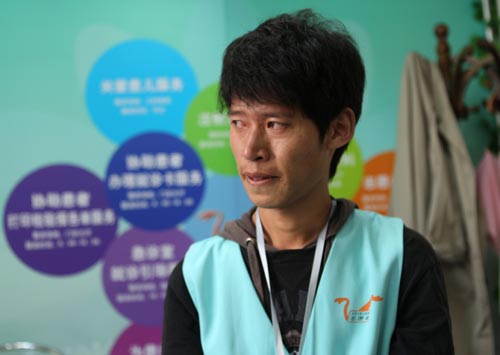Profiles
Dreams of giving something back
By He Dan (China Daily)
Updated: 2010-07-07 07:45
 |
Large Medium Small |
BEIJING - After a 37-hour train journey, Ma Xiucai arrived at Beijing West Railway Station last Thursday in the hope of fulfilling a promise he made to himself and held in his heart for four years.
"I have received love and help for too long, now I want to give," said the 21-year-old village man from the Liangshan Yi autonomous prefecture in Sichuan province.
Ma is now serving as a volunteer at the outpatient department of Peking University People's Hospital, guiding anyone who needs help with directions or filling out medical forms.
|
 Ma Xiucai:"I feel good helping people and what I do has been learnt from the kindhearted doctors I have met." [China Daily] |
"I feel good helping people and what I do has been learnt from the kindhearted doctors I have met," said Ma with a big smile on his face.
Ma's father died in a mine accident when he was 12 years old and his sick mother has since passed away. Ma and his four siblings rely on their uncle for support.
As an idiopathic scoliosis patient, Ma thought he would never walk normally as a child, because his impoverished family could not afford the expensive medical fees.
When Ma saw a doctor in Chengdu, capital of Sichuan, he was told the initial treatment would cost about 70,000 yuan ($10,300) and the price of the entire treatment would be at least 200,000 yuan.
With the passage of time, Ma was forced to drop out of high school when the pain in his legs became unbearable.
"It hurt whether I walked or sat, so I couldn't make my way to school," Ma said. "In our village, you have to walk kilometers of mountain road to get to school."
However, a volunteer medical team from Peking University People's Hospital renewed Ma's hopes in 2006.
After reading in a local newspaper that the medical team offered free medical treatment for the poor, Ma's uncle rushed to the hospital with his nephew.
Due to the shortage of medical devices in the local hospital and the complexity of Ma's condition, the team arranged for Ma to have an operation in Beijing.
"Ma was already 17 when he came to our hospital. The skeleton of his body was almost mature, which complicated the procedure for correcting it," said Liu Haiying, Ma's attending doctor.
"But he badly needed the operation, because his heart and lungs had become deformed in this chest, which posed a risk to him surviving his 30s."
The surgery was successful and Ma's life got back on track after 14 screws were implanted in his backbone.
Ma was not the only person fortunate to receive timely treatment from the visiting medical team.
In 2004, the Ministry of Health called for hospitals in urban areas to provide support to medical forces in the poor regions. Since then, Peking University People's Hospital has sent five volunteer teams to the western regions' hinterlands and more than 13,000 rural residents have received treatment, said Wang Tiezheng, a publicity official at the hospital.
"(Ma) Xiucai was grateful to anyone who once helped him. Although I was not surprised to hear from him, I was warmed by a text message that I received from him on Thanksgiving Day," said Huang Jie, a nurse in the department of spinal surgery.
Ma took the national college entrance exam this summer and his school of choice for studying medicine was Chengdu University of Technology.
"Doctors are the greatest people. They can give patients the help they need," Ma said. "My dream is to become a doctor, too."